#margaretta Eagar
Explore tagged Tumblr posts
Text
Romanov myths part three - did the Grand Duchesses go shopping?
Over the years, a prevalent belief that the Romanov Grand Duchesses, Olga, Tatiana, Maria, and Anastasia, did not go shopping continues to be repeated. Some historians have even suggested that the girls did not know how paying for items worked. However, primary sources from people who knew the girls, were members of their entourage, and the Grand Duchesses' own diaries, tell a different story...
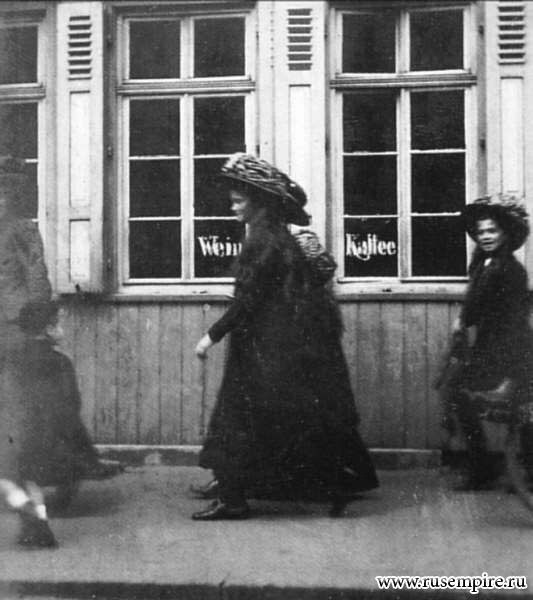
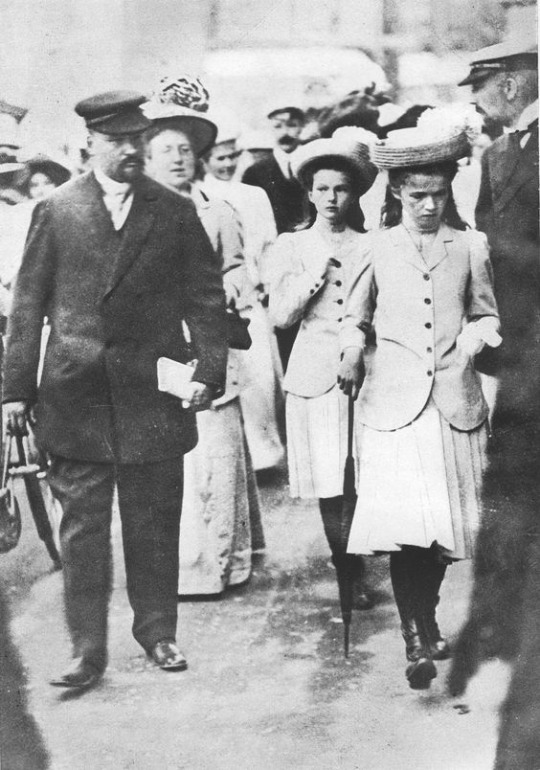
"Saturday. 10 August. … We walked along the historic boulevard and the main streets, but crowds followed us everywhere, so we were able to go into only 2 shops for a minute..." "Friday. 15 November. Had lessons, after that went shopping for wool with Nastenka as usual.." From Grand Duchess Olga Nikolaevna’s 1913 diary [my underlining]
In this entry, Olga describes shopping Countess Anastasia 'Nastenka' Vassilievna Hendrikova, who was a young lady-in-waiting at court and a particular favourite of the Grand Duchesses, often accompanying them on trips. As described in the first entry, it appears that safety and security concerns due to crowds, rather than a lack of understanding about shops, contributed to the Grand Duchesses not being able to shop frequently. Nastenka is frequently mentioned by the Grand Duchesses in their diaries, and volunteered to join the Romanov family in their house arrest and imprisonment. She was murdered by the Bolsheviks in September 1918.
"After coffee, I went for a walk with my pupils… They really liked to go to the shops and buy everything. Anastasia Nikolaevna was especially attracted to stores, where they sold doll shoes of various sizes… Tatiana Nikolaevna did not always accompany since the doctors found her heart was weak and she went with the Empress to take baths." A Few Years Before the Catastrophe by Sofia Ivanovna Tyutcheva.
Sofia Ivanovna Tyutcheva was a maid-of-honour to Tsarina Alexandra Feodorovna, and in 1907 was appointed as governess to the Grand Duchesses. The Grand Duchesses referred to her as "Savanna". She was dismissed in 1912 when she voiced concerns over Grigori Efimovich Rasputin. She wrote a short memoir in 1945, and passed away in 1957.
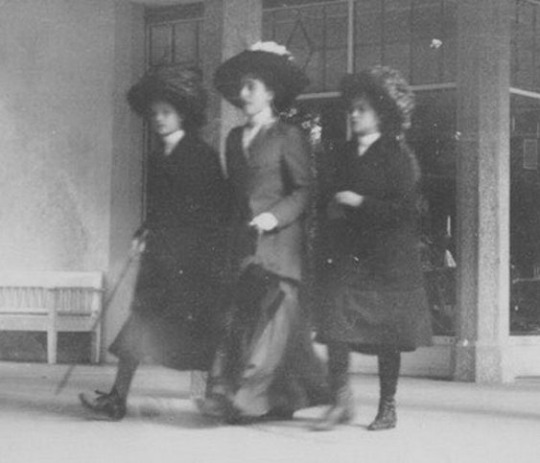
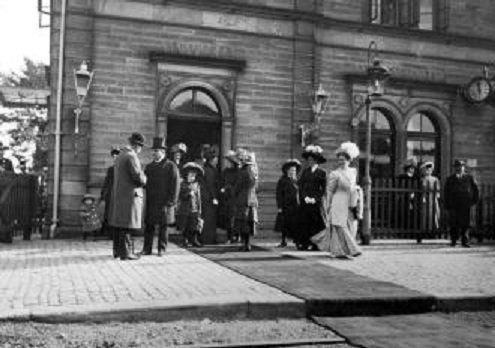
"[The] Grand Duchesses went shopping in the morning with one of the ladies-in-waiting to the Empress. They delighted in that because they could mix with the crowd and buy things just as everyone else did, and they were so pleased if they were not recognised at once." -- Upheaval - Olga Voronova [my underlining]
Countess Olga Konstantinovna Voronova was part of the aristocratic Kleinmichel family and in 1914, married one of the Romanov's favourite officers, Pavel Alexeievich Voronov. Through these connections, Olga Konstantinovna became a friend of the Grand Duchesses, exchanging frequent letters with Olga and Tatiana in particular, before and after the Revolution. She published her memoirs in 1932. Once again, it is inferred that being recognised and subsequent security concerns stifled the Grand Duchesses' shopping sprees.
Where did the myth come from?
It appears that the myth came about due to this extract from Margaretta Eagar, an Irish nanny who cared for the children from 1898 to 1904:
Her only knowledge of shops and shopping was derived from the toy and sweet shops in Darmstadt. One day she asked me why the Americans spoke English, not American. I told her the story of the Pilgrim Fathers, and described how they built houses and shops, and so made towns. She was exceedingly interested and inquired, ' Where did they find the toys to sell in the shops ? " Six Years at the Russian Court, by Margaretta Eagar
It appears that some historians forgot that Margaretta Eagar moved on from her nanny position in 1904, when the eldest Grand Duchess was nine and the youngest was three, and perhaps did not look for sources from when the Grand Duchesses had grown up and had slightly more independence.
Over time, the myth appears to have been exaggerated and repeated until it became part of the 'folklore' surrounding the Romanov Grand Duchesses, portraying them as isolated and naïve.
Whilst it is clear that the Grand Duchesses did enjoy going shopping in their lifetimes, safety and security concerns meant they could not enjoy shopping as frequently as other teenagers may have. In the same way royals today would not be able to go to shops without being recognised, there was a chance that a crowd could gather. Similarly, Olga and Tatiana appear to have shopped more than the younger pair, Maria and Anastasia, likely due to being older in age and therefore having more independence.
Photos:
First set, left: Olga, Anastasia (hidden behind Olga), and Maria Shopping in Germany, 1910. Right: Olga and Tatiana out shopping in the Isle of Wight, 1909, accompanied by Dr. Evgeny Botkin (in the suit)
Second set, left: Tatiana and Maria shopping with Sofia Ivanovna Tyutcheva, circa 1910. Right: The Grand Duchesses and their entourage by shops, most likely taken in Germany, 1910
Sources:
Journal of a Russian Grand Duchess: Complete Annotated 1913 Diary of Olga Romanov, Eldest Daughter of the Last Tsar, translator Helen Azar, (Independently published: 2015)
A Few Years Before the Catastrophe: The Memoirs of Sofia Ivanovna Tyutcheva, translator George Hawkins, (Independently published: 2020)
Upheaval, Olga Voronova (Woronoff), (New York; London: G. P. Putnam's Sons, 1932) -- Free to read online here
Six Years at the Russian Court, Margaretta Eagar, (New York: Charles L. Bowman and Company, 1906) -- Free to read online here
#Romanov#Romanov family#otma#Olga Nikolaevna#Tatiana Nikolaevna#Maria Nikolaevna#Anastasia Nikolaevna#sources#myths#myth-busting#Romanov sisters#Margaret Eagar#Margaretta Eagar#Sofia Ivanovna Tyutcheva#Nastenka Hendrikova#diaries#free to read#Olga Romanov#Tatiana Romanov#Maria Romanov#Anastasia Romanov
132 notes
·
View notes
Text

"Where Princess Ella was, no angry disputes could exist. She was so sweet and just that the other children always gave in to her arbitration. Looking back on her short life I often wonder why we did not see that she was quite too good for this world, her fit companions were the angels. She was a regular little mother, and was never so happy as with the 'tiny cousin,' as she called Anastasie." – Margaretta Eagar, Six Years at the Russian Court
#history#historical photos#romanovs#anastasia nikolaevna#anastasia romanov#german royalty#margaretta eagar#memoirs#letters/diary entries/quotes#elisabeth of hesse
45 notes
·
View notes
Text

OTMA + Margaretta Eagar 1899-1904
“One day during Eastertide we were out driving on the Nevski Prospect, and the little Grand Duchess Olga was not good. I was speaking to her, trying to induce her to sit down quietly, when suddenly she did so, folding her hands in front of her. In a few seconds she said to me, "Did you see that Policeman?" I told her that was nothing extraordinary, and that the police would not touch her. She replied," but this one was writing something; I was afraid he might have been writing' I saw Olga, and she was very naughty." I explained that this was very unlikely, and she reminded me, rather reproachfully, that one day, some time before, she had seen a drunken woman arrested in the street, and had wished me to tell the police not to hurt her. I "had refused to interfere, saying that the woman was naughty and the police quite right in taking her. I now explained that one had to be quite big and very naughty indeed before the police would take one to prison. On returning home she made particular inquiries as to whether a policeman had come while she was out. When she went to see her parents that afternoon she recounted the whole story to her father, telling him that I said it was quite possible to live without going to prison. She then asked her father if he had ever been a prisoner; the Emperor answered that he had never been quite naughty enough to go to prison. Her remark then was: "Oh! how very good you must have been, too."
“When she was a very little child, she was one day with her sister in the Empress's boudoir, where the Emperor and Empress were at tea. The Empress had tiny vanilla-flavoured wafers called biblichen, of which the children were particularly fond, but they were not allowed to ask for anything from the tea table. The Empress sent for me, and when I went down little Marie was standing in the middle of the room, her eyes drowned in tears and something was swallowed hastily. "Dere! I've eaten it all up," said she, "you tant det it now." I was properly shocked, and suggested bed at once as a suitable punishment. The Empress said, "Very well, take her," but the Emperor intervened, and begged that she might be allowed to remain, saying, I was always afraid of the wings growing, and I am glad to see she is only a human child."
“We took the children to a toy shop, and they were told that they might choose what they liked for themselves, and also for relations and friends at home. Olga looked at the things, and finally chose the very smallest she could find, and said, politely, "Thank you very much." Vainly the shop people showed her more attractive toys; she always replied: "No, thank you; I don't want to take it." I took her on one side and asked her why she would not buy the toys. I said that the people would be very sad if she would not take more, and that she could not leave the shop without buying more. So she said: "But the beautiful toys belong to some other little girls, I am sure; and think how sad they would be if they came home and found we had taken them while they were out." I explained to her, and she and Tatiana laid in a large stock.
“Just before we went to Peterhoff that year, the Grand Duchess Olga had typhoid fever. She had been ailing for a few days, but the weather was unusually hot for the time of the year, and we thought that might be the cause and that the cooler air of the seaside would probably be beneficial to her, so the journey was not postponed. But when we arrived at Peterhoff she was very ill, and had to be put to bed at once. She lay there through five long weary weeks. I nursed her day and night, and at one time she was so ill that I feared she would not recover; but thank God she did. She wearied to see her sister Tatiana, and was very pleased when the doctor said Tatiana might pay her a visit for just five minutes. I went down and fetched her to see Olga. She stood by the side of the bed and conversed in a most amiable manner to the little sick sister. I was rather surprised at her manner, and when the five minutes were up, told her I must take her down to the nursery again. When she got outside of the door, she exclaimed: "You told me you were bringing me to see Olga and I have not seen her." I told her that the little girl in bed was indeed her sister. She cried with great grief. "That little pale thin child is my dear sister Olga! Oh no, no! I cannot believe it!" She wept bitterly at the change, and it was difficult to persuade her that Olga would soon be herself again.”
- Six Years At The Russian Court by Margaretta Eagar (Nanny to OTMA)
#margaretta Eagar#otma#Romanov#Romanovs#quotes#diaries and letters#six years at the Russian court#olga nikolaevna#maria nikolaevna#anastasia nikolaevna#tatiana nikolaevna#russian history#russian imperial family#grand duchess tatiana nikolaevna of russia#grand duchess Olga nikolaevna of Russia#grand duchess Maria nikolaevna of Russia#grand duchess anastasia nikolaevna of russia#1899#1904#grand duchesses#Russia
22 notes
·
View notes
Text

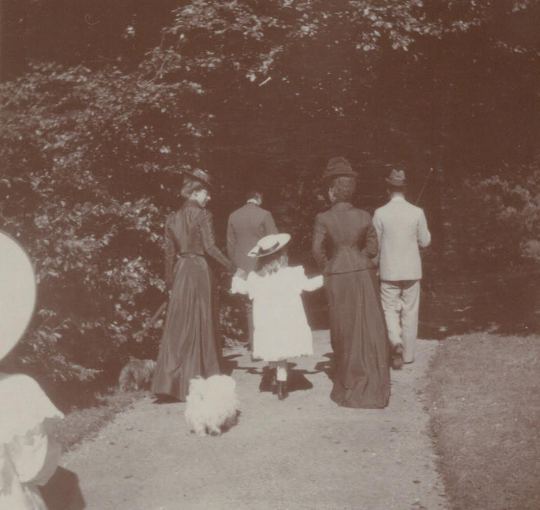
Queen Alexandra of Great Britain and Ireland (née Princess of Denmark) with her Great-Nieces Grand Duchesses Olga, Tatiana, and Maria Nikolaevna, Denmark 1901 ✨
“King Edward VII arrived after we did, and the day he was expected Queen Alexandra came into the nurseries and told me he was coming, and asked me to make the children look very nice. I showed her the dresses I had prepared for them, and she admired them very much. She often said they were always so nicely dressed and kept.”
— Margaretta Eagar; Six Years At The Russian Court
#awww 🤍🥹#queen alexandra#olga nikolaevna#tatiana nikolaevna#maria nikolaevna#otma#romanov#queen alexandra of the united kingdom#princess alexandra of denmark#1901#danish royal family#demark#Six years at the russian court#Margaretta eagar#Letters and diaries#Quotes
26 notes
·
View notes
Note
Are there any interesting facts about Maria
I think it's fairly common knowledge that she had the 'royal memory for faces,' and never forgot a person, but it seems she just had a really good memory in general. Alexander Spiridovitch, who was head of Nicholas II's personal guard for about 10 years, mentioned this:
Marie Nicolaievna was a well-developed, robust girl, with large blue eyes, of a typically Russian beauty. She had an excellent memory, and whenever it was a question of remembering something, her sisters left it to her.
It was the nanny, Margertta Eagar, who mentioned her royal memory for faces. And of course Eagar left the staff when Maria was still quite young, but I find this description of her pretty interesting as a contrast to some of the other descriptions of her:
Marie was more remarkable for her goodness than anything else, but she also learned very quickly. She was always very anxious to begin lessons and she would listen and look and try to reproduce. [. . .] She has great determination, and whatever she attempts to do she always finishes and carries through.
Margaretta Eagar, “Further Glimpses of the Tsaritsa’s Little Girls,” in The Girl’s Own Paper and Woman’s Magazine, 1909.
And that reminds me of an anecdote from Sydney Gibbes, the English tutor, where one time Empress Alexandra sat in on one of Maria's lessons and was concerned that Gibbes had left the book open on the table. He assured her that "Marie never looked, or, if she did, always confessed immediately."
I feel like poor Maria is sometimes painted as less clever than her siblings, or as just sort of a lazy daydreamer, and these little tidbits offer a different perspective.
53 notes
·
View notes
Photo


Tatiana, Anastasia, Olga and Maria with Margaretta Eagar. 1902
#otma#romanov#olga nikolaevna#tatiana nikolaevna#maria nikolaevna#anastasia nikolaevna#margaretta eagar
13 notes
·
View notes
Photo


Grand Duchess Olga Nikolaevna, Grand Duchess Maria Nikolaevna, Grand Duchess Tatiana Nikolaevna and Margaretta Eagar in Moscow, April 1900.
Photos from: Tsaritsa Alexandra Feodorovna's 1899-1900 Album
#OTM#Olga Nikolaevna Romanova#Tatiana Nikolaevna Romanova#Maria Nikolaevna Romanova#1900#Margaretta Eagar#Moscow
55 notes
·
View notes
Photo

Grand Duchesses Anastasia and Maria, 1904
“It [whooping cough] speedily spread to the nurseries and to the four children. The Russian nurse and I contracted it. I had told the children that they were to be most careful not to cough on anyone, or that person might take the disease from them, and they were very obedient.
One day the little Grand Duchess Anastasie was sitting on my lap, coughing and choking away, when the Grand Duchess Marie came up to her and putting her face close up to her said, ‘Baby, darling, cough on me.’ Greatly amazed, I asked her what she meant, and the dear child said, ‘I am so sorry to see my dear little sister so ill, and I thought if I could take it from her she would be better.’ Was it not touching?”
- Margaretta Eagar
#Anastasia Nikolaevna#Maria Nikolaevna#the little pair#1904#1900s#margaretta eagar#romanov#romanovs#Grand Duchess Anastasia#Grand Duchess Maria
161 notes
·
View notes
Photo

Grand Duchess Alexandra Alexandrovna of Russia (1842-1849) by Vladimir Ivanovich Hau.
“A pretty golden-haired child she was...” - Margaretta Eagar
#grand duchess alexandra alexandrovna#romanov#russia#vladimir ivanovich hau#portrait#margaretta eagar#quotes
141 notes
·
View notes
Text
127 years ago on this day, Grand Duchess Tatiana Nikolaevna was born

Her nanny, Margaretta Eagar, recalled the compassion and concern Tatiana (then eight years old) showed when "One of the under-nurses was married last year. She had come to the palace straight from her school, at seventeen years of age, and was there for nearly seven years. She was naturally very much attached to the children, and when her last day came was in floods of tears all through the day, and the children were terribly distressed to see her in such grief. The little Grand Duchess Tatiana told her she could stay on if she liked, she knew we all loved her and would be sorry to part from her; and then she came running to me to beg me not to send dear Tegla away. I answered that she might stay if she liked, but that she had promised to marry Vladislav; it was her own wish, and I did not think she would like to break her word.
The other girls gave a little party to celebrate her leaving us, and the young man was amongst the guests. When the girl heard that he had arrived her grief broke forth again. She realised that the time of parting had come, and the children cried most bitterly. Little Tatiana Nicolaivna took a sheet of paper and a pencil, and wrote with great difficulty a letter which I translate: "Vladislav, Be good with Tegla. Tatiana." She placed this letter in an envelope and printed in large letters on the envelope, Vladislav, and sent it to him by the housemaid. I went in later to speak to the man and wish him happiness. He pulled this letter out of his pocket, and with tears in his eyes begged me to thank the little Grand Duchess, and assure her that he would never forget to be good to Tegla. All the more, because it was Tatiana Nikolaevna’s wish. He always carries the letter about with him. She came to visit us several times after her marriage and was very happy. Whenever she writes she always sends a special message to Tatiana to say that Vladislav is very good to her, and the little one looks so pleased and says, "Well, I am glad."”
Happy birthday Grand Duchess Tatiana!








Sources: Margaretta Eagar, Six Years at the Russian Court, (New York: Charles L. Bowman & Company, 1906), p. 267-269
#tatiana nikolaevna#Tatiana Romanov#birthdays#Margaret Eagar#margaretta eagar#sources#Romanov family#Romanov sisters#OTMA#on this day
51 notes
·
View notes
Text
A Wolf in Heaven

"The Grand Duchesses Olga and Tatiana Nicholaivna were fond of listening to stories. On one occasion Tatiana told Olga a story, the end of which was as follows: 'So my little girl and my niece went into the wood and a big wolf ate my little girl, so she went to heaven.' Olga was horrified at such theology. 'Oh no!' she cried; 'she could not have gone to heaven, because the wolf ate her, and God does not allow wolves to go to heaven. She is walking about the wood inside the wolf.' The other child calmly accepted this wonderful correction." – Margaretta Eagar, Six Years at the Russian Court
#history#imperial russia#historical photos#romanovs#olga nikolaevna#tatiana nikolaevna#romanov sisters#romanov#romanov family#romanov formals#childhood anecdotes#margaretta eagar#memoirs#letters/diary entries/quotes#quotes#the big pair#1900#early 1900s
20 notes
·
View notes
Note
Is there any OTMA anecdotes at christmas you know about?
Hello anon! Yes there are plenty!!! I’m so happy you asked this because Christmas is today and what better way to learn more about Romanov Christmases than to hear it from their own words! ❤️
“We had a Christmas party for all who live in the house with us. During the evening of the 24th, at 9 1/2 o'cl. we had a vsenoshnaya, rather late, but the priest could not get here calier, and at the table, with all the icons [we] set up a tree and lit it up. It stood there during the entire vsenoshnaya. It was very nice and cozy. We did not hang anything on the tree.” - Letter from Tatiana to Countess Zinaida Tolstaya, 16 December 1917
“Hello my dear Ritka! Well, the Holidays are upon us already. We have a Christmas tree in the corner of the hall and it dispenses a wonderful scent, but not at all the same as in Tsarskoe [Selo]. This is some special kind of tree called "bal-sam." It smells strongly of oranges and tangerines, and there is resin flowing down the trunk constantly. There are no ornaments, but only silver streams and wax candles, of course from the church, since there are no other.” Letter from Olga Nikolaevna to friend Margarita “Rita” Khitorovo, December 26th 1917
“We generally spent Christmas at Tsarskoe Selo. It is less observed than Easter in general, but in the palace it is a great festival. There were no fewer than eight Christmas trees in various parts of the palace. The Empress dressed them all herself, and personally chose the presents for each member of her household, and for each officer, to the number of about five hundred. A tree was arrayed for the Cossacks in the riding-school. The children and I had a tree for ourselves. It was fixed into a musical-box which played the German Christmas hymn, and turned round and round. It was indeed a glittering object. All the presents were laid out on white covered tables, and the tree stood for several days an object of intense interest and admiration to the children. They were very sad when it was dismantled just before we went to St. Petersburg, but they were consoled by being allowed to help, and to divide the toys between the members of their own household.” Six Years At The Russian Court by Margaretta Eagar
“The little girlies were delighted to se her [Empress Alexandra Feodorovna] so gorgeously attired; they circled round her in speechless admiration for some time, and suddenly the Grand Duchess Olga clapped her hands, and exclaimed fervently, "Oh! Mama, you are just like a lovely Christmas tree!" After divine service was finished there was a drawing-room, at which all the debutantes were presented.” Six Years At The Russian Court by Margaretta Eagar


I hope you all have an AMAZING Christmas and a Happy New Year!!! 🎄🎉🤍
#answered ask#merry christmas#christmas#otma#otmaa#olga nikolaevna#tatiana nikolaevna#maria Nikolaevna#anastasia nikolavena#naotmaa#alexei nikolaevich#tsar nicholas ii#romanovs#romanov#alexandra feodorovna#Romanov Christmas#Six years at the Russian court#Margaretta eagar#letters and diaries
30 notes
·
View notes
Text
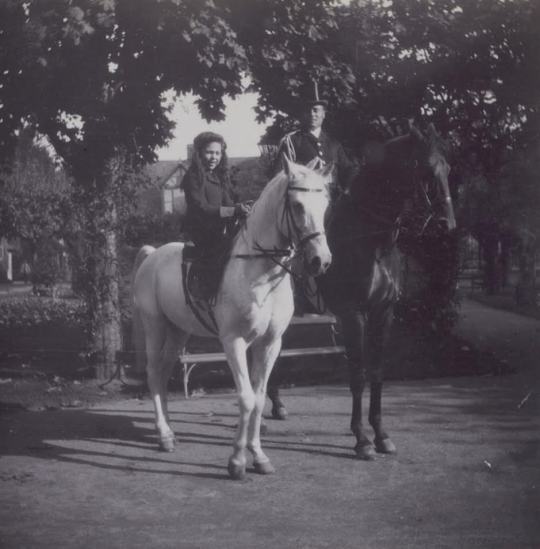
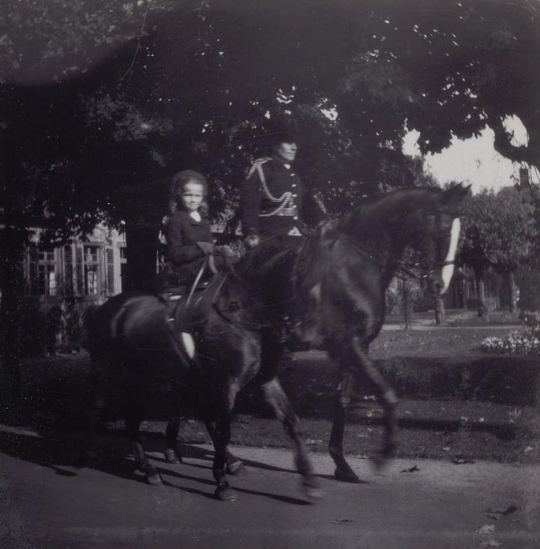
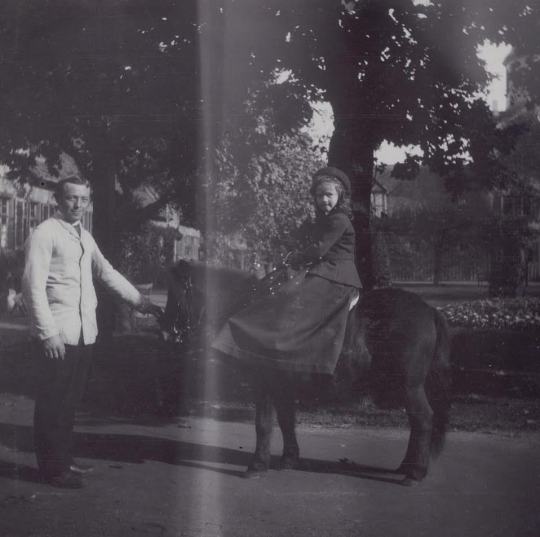
Princess Elisabeth of Hesse riding horses with her cousins Grand Duchesses Olga and Tatiana Nikolaevna of Russia, Wolfsgarten 1903
It was a pretty sight to see her riding with the two eldest cousins in the riding school; she mounted on a great white horse and her cousins on little ponies. She rode wonderfully well, and would take either of the little ones before her on the saddle, and give them a ride round the school.
— Margaretta Eagar, Six Years At The Russian Court
#💜🥹✨#olga nikolaevna#tatiana nikolaevna#princess elisabeth of hesse#ella of hesse#elisabeth of hesse#princess elisabeth of hesse and by rhine#quotes#letters and diaries#otma#romanov#margaretta eagar#Six years at the russian court#1903#wolfsgarten#Hesse#hessian royal family
27 notes
·
View notes
Note
Hi there, do you own any copies of the girls' own paper? I'm looking for the edition with Margaretta Eagar in it and am having difficulty tracking down the exact volume as they're not numbered or dated... do you know if the November of 1909 with a grey outfit holding red leaves is the right one?
Many thanks!
Alas, I don't.
I have the articles in a republished version of Eagar's memoirs, but they aren't cited very well. They are also cited in "From Cradle to Crown" by Charlotte Zeepvat, but again . . . minimally:
Eagar, M. 'Further Glimpses of the Tsaritsa's Little Girls,' and 'More about the Little Grand Duchesses of Russia,' in the Girl's Own Paper and Woman's Magazine, vol. XXX (1909).
Which, as you said, makes it incredibly hard to track them down :(
6 notes
·
View notes
Photo


Margaretta Eagar and Grand Duchess Maria Nikolaevna, Spala 1900.
19 notes
·
View notes
Photo

Grand Duchess Olga Nikolaevna, Grand Duchess Maria Nikolaevna and Grand Duchess Tatiana Nikolaevna with Margaretta Eagar at the hunting lodge in Spala, 31st August - 14th September 1900.
"Various surprises had been arranged for the children. In a little orchard a tea-house had been built and about a dozen tame deer turned in, besides tame pheasants, hares, etc. These creatures would all come and eat from our hands, and the deer would follow me about everywhere, lay their pretty heads on my arm and, looking beseechingly in my face, seem to beg for notice. The Grand Duchess Tatiana named them "the pretty creatures" and by this name they were henceforth known. Outside the palings enclosing this fairyland flowed a river in which swam all manner of water-fowl which would come to be fed; so it was a regular paradise for children. A further surprise awaited them in the shape of a little goat-carriage drawn by a pair of goats, each led by a boy in Polish costume, a long frock coat of white homespun decorated with black braid, and a high crowned black felt hat trimmed gaily with bands of black velvet ribbon, coloured paper flowers and a rosette of different coloured ribbons. The trimming was pinned on the hat!"
Eagar, M. (1906) Six years at the Russian court. New York : Charles L. Bowman & co, pp.114-115.
Photo from: Tsar Nicholas II 1900 Spala Album
#OTM#1900#Olga Nikolaevna Romanova#Tatiana Nikolaevna Romanova#Maria Nikolaevna Romanova#Margaretta Eagar#Spala
45 notes
·
View notes